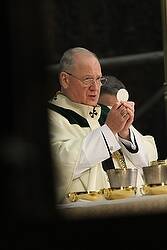What is gratitude? It's been on my mind a lot recently. It's on my mind everyday, actually, because in addition to teaching, a big part of my job is showing gratitude. In my role as director of advancement, I have the privilege of thanking benefactors.
For most moderns, gratitude involves an expression of thanks – heartfelt thanks, to be sure, but basically thanks. But of late I realized that mere "thanks" wasn't sufficient for what I wanted to communicate to some people who had been of extraordinary service to me and the school. I thought I'd do a little digging into the word "gratitude" to see what I could find, thinking the concept might have more meaning than our watery contemporary usage.
The word can be traced to the Latin gratia. And gratia, of course, carries a rich meaning. Gratia is what we translate as "grace," and grace is the outpouring of God’s life into our life. In the words of Boston College professor Fr. Michael Himes: Grace is the "name for the self-gift of God outside the Trinity...." Grace is the love of the Father, Son and Holy Spirit spilling out into the world.
Hearing gratia, you might recall the opening words of the Ave Maria: "Ave Maria, gratia plena...." Gratia: Mary is filled with grace. Traditional interpretations of Mary's gratia hold that Mary is filled with God's favor, but might we also introduce the notion of gratitude? Perhaps that’s one way to understand why Mary was chosen: not primarily because she was holy, but because she was thankful; or perhaps she was holy because she was thankful. In her thankfulness, she reflected the Trinitarian love.
It makes me wonder whether this is the message for us: that thankfulness leads to holiness. Gratitude nourishes faith. If I am thankful, not here and there, not on occasion, but rather at the core of my being; if my stance toward the world is fundamentally characterized by the recognition that the totality of my life and experience is entirely a gift, how could I avoid being joyful? If we all did this, how could we remain trapped in patterns of covetousness?
I don’t know the mathematics of grace and holiness. I do know, however, that gratitude is inseparable from God, from faith, from discipleship. It becomes even more evident when we consider the heart of the whole Christian project: "Eucharist" means thanksgiving. The Eucharist is fundamentally a meal of gratitude. The night before he's crucified, Christ gives thanks. In the worst of circumstances, Christ carries an attitude of appreciation.
On one level this might strike us as impossible, maybe even absurd. But this may very well be one of those moments where what appears to us as foolish might be most wise. It might be the case that Christ is showing us the way out, or the way through, darkness. Paradoxically, in the hour when we seemingly have nothing to be thankful for, that's when thankfulness is most needed. Thankfulness, gratitude, gratia, grace: now and at the hour of our death, Amen.








